新目标英语八年级下册第三单元知识点讲解与练习
- 格式:doc
- 大小:83.50 KB
- 文档页数:15
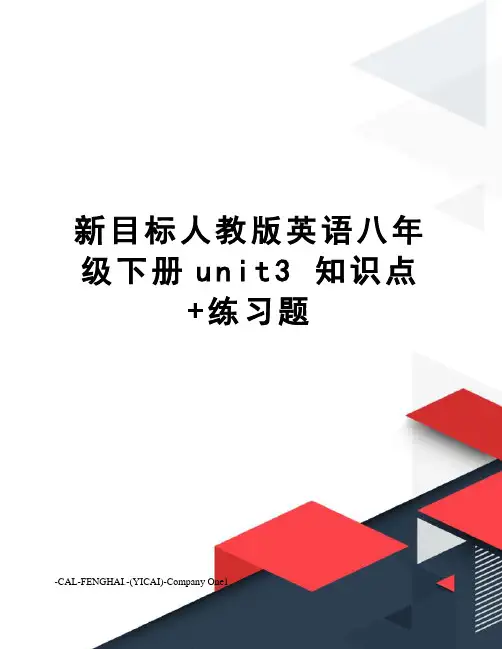
新目标人教版英语八年级下册u n i t3知识点+练习题-CAL-FENGHAI.-(YICAI)-Company One1Unit3 Could you please clean your room?Section A(1a-2d)学习目标:1.掌握1a-2d的词语2.学习提出礼貌的请求和请求允许;3.学会使用句型:Could you please...和Could I...;4.学习重点:掌握一些家务活动相关的动词短语。
掌握情态动词could的用法和助动词do的用法。
5.学习难点:掌握情态动词could的用法和助动词do的用法【一】自主学习明确目标1 试读单词,解决语音问题,联系有关旧单词2 查阅下面的短语动词1) 出去吃饭_______________ 2)在外面待到很晚_______________3)去看电影_______________ 4)搭车_______________5)完成做某事_______________ 6)干净整洁_______________ 7)洗餐具_______________ 8)倒垃圾_______________9)叠衣服_______________ 10)扫地_______________ 3.观察以上词组的构成方式:【语言点】1. —Peter, could you please take out the trash请你把垃极倒掉好吗—Sure, Mom.可以,妈妈。
—Could you please do the dishes 请洗盘子好吗—Sorry, I can’t. I have to do my homework.抱歉,我不能。
我得做作业。
(1)在表示请求帮助或请求允许的疑问句中,常用could代替can,以表示礼貌,委婉或不确定的语气,而can则不具备这些语气。
这种情况下不能把could看作can的过去式。
以上两句中用could是为了表示礼貌的请求。
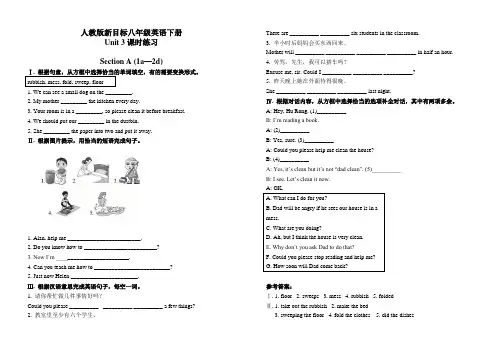
人教版新目标八年级英语下册Unit 3课时练习Section A (1a—2d)rubbish, mess, fold, sweep, floor1. We can see a small dog on the _________.2. My mother _________ the kitchen every day.3. Your room is in a _________, so please clean it before breakfast.4. We should put our _________ in the dustbin.5. She _________ the paper into two and put it away.Ⅱ. 根据图片提示,用恰当的短语完成句子。
1. Alan, help me _________________________.2. Do you know how to _________________________?3. Now I’m _________________________.4. Can you teach me how to __________________________?5. Just now Helen _______________________.Ⅲ. 根据汉语意思完成英语句子,每空一词。
1. 请你帮忙做几件事情好吗?Could you please __________ __________ __________ a few things?2. 教室里至少有六个学生。
There are __________ __________ six students in the classroom.3. 半小时后妈妈会买东西回来。
Mother will __________ __________ __________ __________ in half an hour.4. 劳驾,先生,我可以搭车吗?Excuse me, sir. Could I __________ __________ __________?5. 昨天晚上她在外面待得很晚。
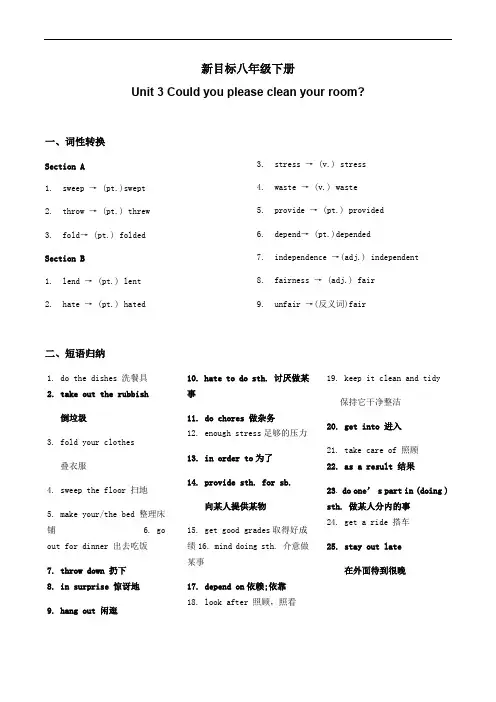
新目标八年级下册Unit 3 Could you please clean your room?一、词性转换Section A1. sweep → (pt.)swept2. throw → (pt.) threw3. fold→ (pt.) folded Section B1. lend → (pt.) lent2. hate → (pt.) hated3. stress → (v.) stress4. waste → (v.) waste5. provide → (pt.) provided6. depend→ (pt.)depended7. independence →(adj.) independent8. fairness → (adj.) fair9. unfair →(反义词)fair二、短语归纳1. do the dishes 洗餐具2. take out the rubbish倒垃圾3. fold your clothes叠衣服4. sweep the floor 扫地5. make your/the bed 整理床铺6. go out for dinner 出去吃饭7. throw down 扔下8.in surprise 惊讶地9. hang out 闲逛10. hate to do sth. 讨厌做某事11. do chores 做杂务12. enough stress足够的压力13. in order to为了14. provide sth. for sb.向某人提供某物15. get good grades取得好成绩16. mind doing sth. 介意做某事17. depend on依赖;依靠18. look after 照顾,照看19. keep it clean and tidy保持它干净整洁20. get into 进入21. take care of 照顾22. as a result 结果23. do one’ s part in (doing )sth. 做某人分内的事24. get a ride 搭车25.stay out late在外面待到很晚三、句型集萃1. Could you please help out with a few things? 你能帮忙做些事情吗?2.Mom will be back from shopping at any minute now. And she won’t be happy if she sees this mess.妈妈现在随时都会购物回来,如果她看到这些一团糟,会不高兴的。
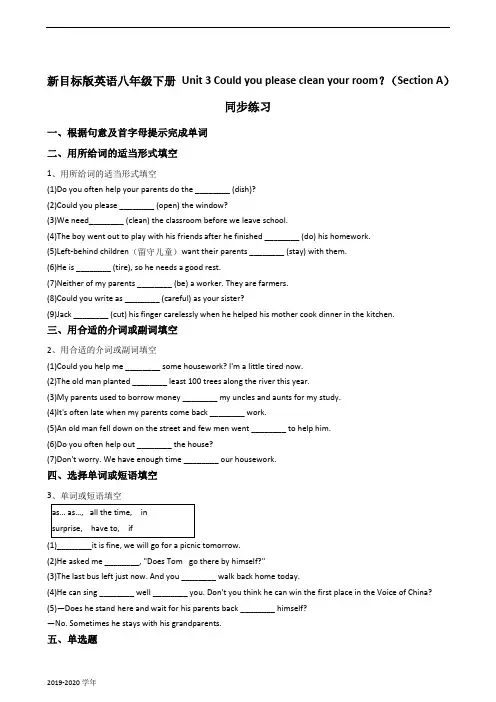
新目标版英语八年级下册Unit 3 Could you please clean your room?(Section A)同步练习一、根据句意及首字母提示完成单词二、用所给词的适当形式填空1、用所给词的适当形式填空(1)Do you often help your parents do the ________ (dish)?(2)Could you please ________ (open) the window?(3)We need________ (clean) the classroom before we leave school.(4)The boy went out to play with his friends after he finished ________ (do) his homework.(5)Left-behind children(留守儿童)want their parents ________ (stay) with them.(6)He is ________ (tire), so he needs a good rest.(7)Neither of my parents ________ (be) a worker. They are farmers.(8)Could you write as ________ (careful) as your sister?(9)Jack ________ (cut) his finger carelessly when he helped his mother cook dinner in the kitchen.三、用合适的介词或副词填空2、用合适的介词或副词填空(1)Could you help me ________ some housework? I'm a little tired now.(2)The old man planted ________ least 100 trees along the river this year.(3)My parents used to borrow money ________ my uncles and aunts for my study.(4)It's often late when my parents come back ________ work.(5)An old man fell down on the street and few men went ________ to help him.(6)Do you often help out ________ the house?(7)Don't worry. We have enough time ________ our housework.四、选择单词或短语填空3、单词或短语填空(1)________it is fine, we will go for a picnic tomorrow.(2)He asked me ________, "Does Tom go there by himself?"(3)The last bus left just now. And you ________ walk back home today.(4)He can sing ________ well ________ you. Don't you think he can win the first place in the Voice of China?(5)—Does he stand here and wait for his parents back ________ himself?—No. Sometimes he stays with his grandparents.五、单选题4、If Nancy ________ the exam, she will go to Australia for English study.A、passB、passedC、passesD、will pass5、Last year I ________ drive. I used to take the bus.A、couldB、couldn'tC、shouldn'tD、should6、—Can you finish________ these books before 10 o'clock?—Yes, I can.A、to readB、readC、readsD、reading7、—What do you usually do ________ your parents aren't at home?—I do my homework. Sometimes I watch TV or play computer games.A、becauseB、whileC、butD、before8、Peter likes pop music, but ________ his father ________ his mother likes it.A、both, andB、not only; but alsoC、neither; norD、either, or9、—Can I ________ your bike?—With pleasure. But you mustn't ________ it to others.A、lend, borrowB、borrow, lendC、lend; lendD、borrow; borrow10、Peter speaks Chinese well indeed, but of course not ________ a local speaker in China.A、so fluently asB、more fluent thanC、as fluent asD、much fluently than11、—Could I borrow your camera?—________, but please give it back by Saturday.A、I'm sorryB、Of courseC、Certainly notD、No, thanks12、—Where can I find a ________ hall to hold so many people?—There is one in the tall building.A、small enoughB、big enoughC、enough smallD、enough big13、—__ __?—No problem.A、Did you have a penB、What time did you get up this morningC、Could you help me with houseworkD、How often do you visit your parents六、根据句意,将下列句子中的画线部分译成汉语或英语14、根据句意,将下列句子中的画线部分译成汉语或英语(1)The boy often helps his parents take out the rubbish when he is free.________(2)My daughter can make the bed well without any help.________(3)Don't stay out late, or I will worry about you.________(4)It's good for you to help out around the house after school.________(5)He 扔下his bag and ran away.________(6)一……就…… the bell rang, the children ran out of the classroom. ________(7)A rich woman often带着狗去散步in the park after supper.________(8)Are you和你的朋友闲逛?________(9)Almost everyone wants to拥有一个干净而舒适的家。
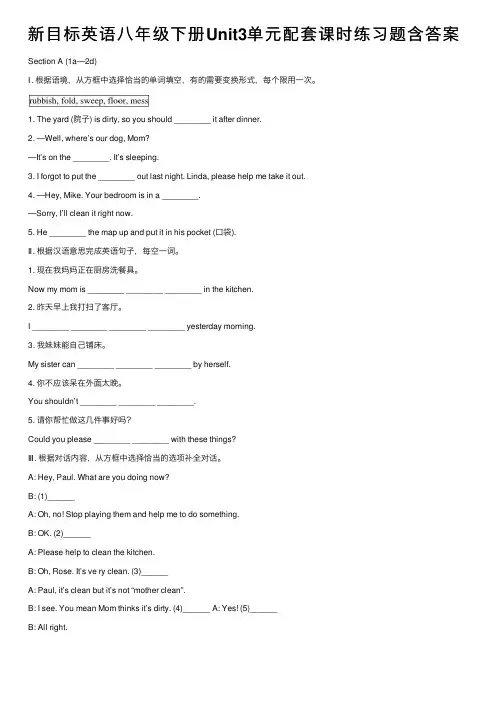
新⽬标英语⼋年级下册Unit3单元配套课时练习题含答案Section A (1a—2d)Ⅰ. 根据语境,从⽅框中选择恰当的单词填空,有的需要变换形式,每个限⽤⼀次。
1. The yard (院⼦) is dirty, so you should ________ it after dinner.2. —Well, where’s our dog, Mom?—It’s on the ________. It’s sleeping.3. I forgot to put the ________ out last night. Linda, please help me take it out.4. —Hey, Mike. Your bedroom is in a ________.—Sorry, I’ll clean it right now.5. He ________ the map up and put it in his pocket (⼝袋).Ⅱ. 根据汉语意思完成英语句⼦,每空⼀词。
1. 现在我妈妈正在厨房洗餐具。
Now my mom is ________ ________ ________ in the kitchen.2. 昨天早上我打扫了客厅。
I ________ ________ ________ ________ yesterday morning.3. 我妹妹能⾃⼰铺床。
My sister can ________ ________ ________ by herself.4. 你不应该呆在外⾯太晚。
You shouldn’t ________ ________ ________.5. 请你帮忙做这⼏件事好吗?Could you please ________ ________ with these things?Ⅲ. 根据对话内容,从⽅框中选择恰当的选项补全对话。
A: Hey, Paul. What are you doing now?B: (1)______A: Oh, no! Stop playing them and help me to do something.B: OK. (2)______A: Please help to clean the kitchen.B: Oh, Rose. It’s ve ry clean. (3)______A: Paul, it’s clean but it’s not “mother clean”.B: I see. You mean Mom thinks it’s dirty. (4)______ A: Yes! (5)______B: All right.答案Ⅰ. 1. sweep 2. floor 3. rubbish 4. mess 5. folded Ⅱ. 1. doing the dishes 2. cleaned the living room3. make her bed4. stay out late5. help out Ⅲ. 1-5 BDAECSection A 3a—Grammar FocusⅠ. 根据句意及所给⾸字母提⽰,补全句中所缺单词。
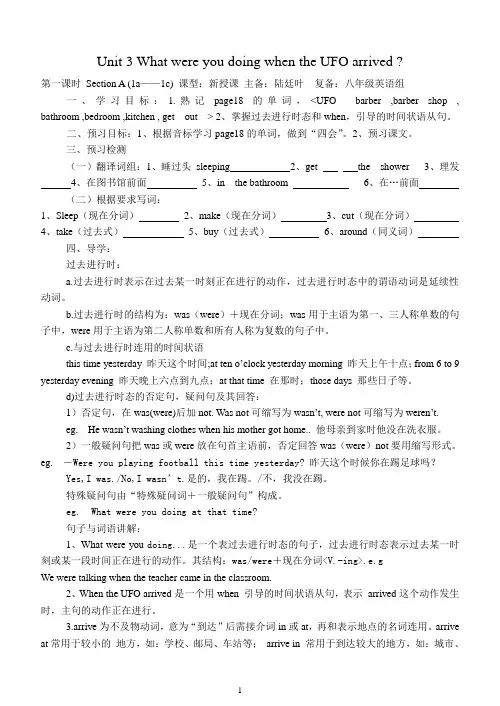
Unit 3 What were you doing when the UFO arrived ?第一课时Section A (1a——1c) 课型:新授课主备:陆廷叶复备:八年级英语组一、学习目标:1.熟记page18的单词,<UFO barber ,barber shop , bathroom ,bedroom ,kitchen , get out > 2、掌握过去进行时态和when,引导的时间状语从句。
二、预习目标:1、根据音标学习page18的单词,做到“四会”。
2、预习课文。
三、预习检测(一)翻译词组:1、睡过头sleeping 2、get the shower 3、理发4、在图书馆前面5、in the bathroom6、在…前面(二)根据要求写词:1、Sleep(现在分词)2、make(现在分词)3、cut(现在分词)4、take(过去式)5、buy(过去式)6、around(同义词)四、导学:过去进行时:a.过去进行时表示在过去某一时刻正在进行的动作,过去进行时态中的谓语动词是延续性动词。
b.过去进行时的结构为:was(were)+现在分词;was用于主语为第一、三人称单数的句子中,were用于主语为第二人称单数和所有人称为复数的句子中。
c.与过去进行时连用的时间状语this time yesterday 昨天这个时间;at ten o’clock yesterday morning 昨天上午十点;from 6 to 9 yesterday evening 昨天晚上六点到九点;at that time 在那时;those days 那些日子等。
d)过去进行时态的否定句,疑问句及其回答:1)否定句,在was(were)后加not. Was not可缩写为was n’t, were not可缩写为weren’t.eg. He wasn’t washing clothes when his mother got home.. 他母亲到家时他没在洗衣服。
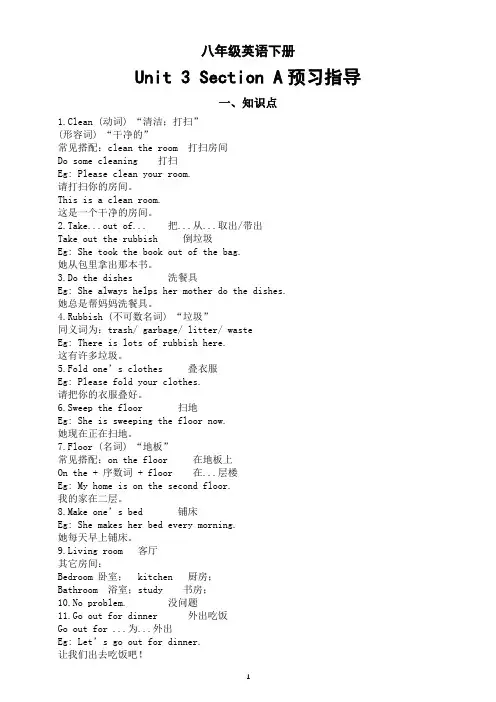
八年级英语下册Unit 3 Section A预习指导一、知识点1.Clean (动词) “清洁;打扫”(形容词) “干净的”常见搭配:clean the room 打扫房间Do some cleaning 打扫Eg: Please clean your room.请打扫你的房间。
This is a clean room.这是一个干净的房间。
2.Take...out of... 把...从...取出/带出Take out the rubbish 倒垃圾Eg: She took the book out of the bag.她从包里拿出那本书。
3.Do the dishes 洗餐具Eg: She always helps her mother do the dishes.她总是帮妈妈洗餐具。
4.Rubbish (不可数名词) “垃圾”同义词为:trash/ garbage/ litter/ wasteEg: There is lots of rubbish here.这有许多垃圾。
5.Fold one’s clothes 叠衣服Eg: Please fold your clothes.请把你的衣服叠好。
6.Sweep the floor 扫地Eg: She is sweeping the floor now.她现在正在扫地。
7.Floor (名词) “地板”常见搭配:on the floor 在地板上On the + 序数词 + floor 在...层楼Eg: My home is on the second floor.我的家在二层。
8.Make one’s bed 铺床Eg: She makes her bed every morning.她每天早上铺床。
9.Living room 客厅其它房间:Bedroom 卧室; kitchen 厨房;Bathroom 浴室;study 书房;10.No problem. 没问题11.Go out for dinner 外出吃饭Go out for ...为...外出Eg: Let’s go out for dinner.让我们出去吃饭吧!12.Go to the movies 去看电影类似词组:see the film 看电影Eg: They went to the movies last night.他们昨晚去看电影了。
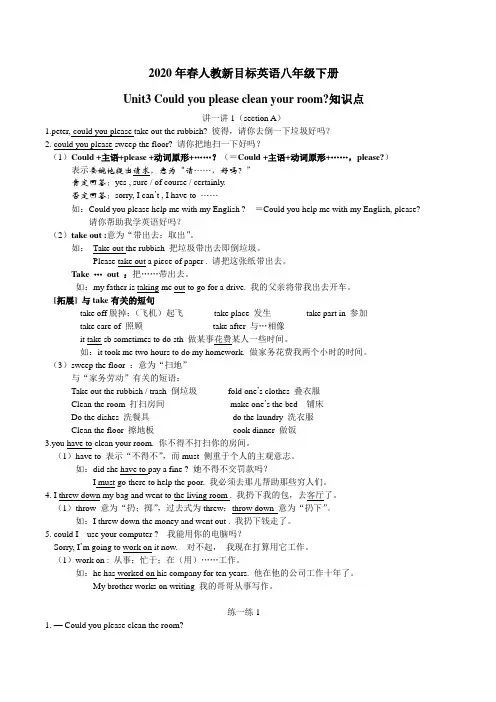
2020年春人教新目标英语八年级下册Unit3 Could you please clean your room?知识点讲一讲1(section A)1.peter, could you please take out the rubbish? 彼得,请你去倒一下垃圾好吗?2. could you please sweep the floor? 请你把地扫一下好吗?(1)Could +主语+please +动词原形+……?(=Could +主语+动词原形+……,please?)表示委婉地提出请求,意为“请……,好吗?”肯定回答:yes , sure / of course / certainly.否定回答:sorry, I can’t , I have to ……如:Could you please help me with my English ? =Could you help me with my English, please?请你帮助我学英语好吗?(2)take out :意为“带出去;取出”。
如:Take out the rubbish 把垃圾带出去即倒垃圾。
Please take out a piece of paper . 请把这张纸带出去。
Take …out :把……带出去。
如:my father is taking me out to go for a drive. 我的父亲将带我出去开车。
[拓展] 与take有关的短句take off脱掉;(飞机)起飞take place 发生take part in 参加take care of 照顾take after 与…相像it take sb sometimes to do sth 做某事花费某人一些时间。
如:it took me two hours to do my homework. 做家务花费我两个小时的时间。
(3)sweep the floor :意为“扫地”与“家务劳动”有关的短语:Take out the rubbish / trash 倒垃圾fold one’s clothes 叠衣服Clean the room 打扫房间make one’s the bed 铺床Do the dishes 洗餐具do the laundry 洗衣服Clean the floor 擦地板cook dinner 做饭3.you have to clean your room. 你不得不打扫你的房间。
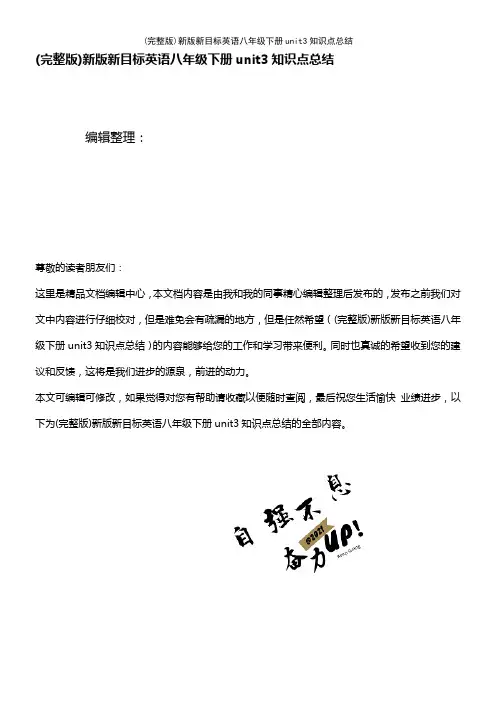
(完整版)新版新目标英语八年级下册unit3知识点总结编辑整理:尊敬的读者朋友们:这里是精品文档编辑中心,本文档内容是由我和我的同事精心编辑整理后发布的,发布之前我们对文中内容进行仔细校对,但是难免会有疏漏的地方,但是任然希望((完整版)新版新目标英语八年级下册unit3知识点总结)的内容能够给您的工作和学习带来便利。
同时也真诚的希望收到您的建议和反馈,这将是我们进步的源泉,前进的动力。
本文可编辑可修改,如果觉得对您有帮助请收藏以便随时查阅,最后祝您生活愉快业绩进步,以下为(完整版)新版新目标英语八年级下册unit3知识点总结的全部内容。
(完整版)新版新目标英语八年级下册unit3知识点总结编辑整理:张嬗雒老师尊敬的读者朋友们:这里是精品文档编辑中心,本文档内容是由我和我的同事精心编辑整理后发布到文库,发布之前我们对文中内容进行仔细校对,但是难免会有疏漏的地方,但是我们任然希望(完整版)新版新目标英语八年级下册unit3知识点总结这篇文档能够给您的工作和学习带来便利.同时我们也真诚的希望收到您的建议和反馈到下面的留言区,这将是我们进步的源泉,前进的动力.本文可编辑可修改,如果觉得对您有帮助请下载收藏以便随时查阅,最后祝您生活愉快业绩进步,以下为〈(完整版)新版新目标英语八年级下册unit3知识点总结> 这篇文档的全部内容。
Unit 3 Could you please clean your room?Section A1.Could you please do sth ?用于提出请求,希望得到对方肯定回答,语气较委婉。
肯定回答:Sure。
/ Of course./ Certainly。
/No problem.否定回答:Sorry ,I can’t. / I’m afraid I can’t。
在表示请求帮助或请求允许的疑问句中,常用could代替can,以表示礼貌,委婉或不确定的语气,而can 则不具备这些语气。
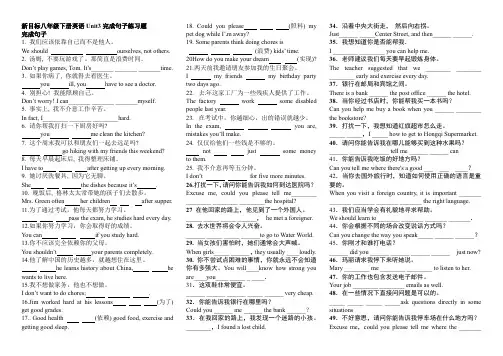
新目标八年级下册英语Unit3完成句子练习题完成句子1. 我们应该依靠自己而不是他人。
We should ourselves, not others.2. 汤姆, 不要玩游戏了。
那简直是浪费时间。
Don’t play games, Tom. It’s_______ _______ _______time.3. 如果你病了, 你就得去看医生。
you ill, you have to see a doctor.4. 别担心! 我能照顾自己。
Don’t worry! I can_______ _______ _______myself.5. 事实上, 我不介意工作辛苦。
In fact, I________ _______ ________hard.6. 请你帮我打扫一下厨房好吗?you me clean the kitchen?7. 这个周末我可以和朋友们一起去远足吗?go hiking with my friends this weekend?8. 每天早晨起床后, 我得整理床铺。
I have to after getting up every morning.9. 她讨厌洗餐具, 因为它无聊。
She the dishes because it’s. 10. 晚饭后, 格林太太常带她的孩子们去散步。
Mrs. Green often her children after supper.11.为了通过考试,他每天都努力学习。
pass the exam, he studies hard every day.12.如果你努力学习,你会取得好的成绩。
You can if you study hard.13.你不应该完全依赖你的父母。
You shouldn’t your parents completely.14.他了解中国的历史越多,就越想住在这里。
he learns history about China, he wants to live here.15.我不想做家务,他也不想做。
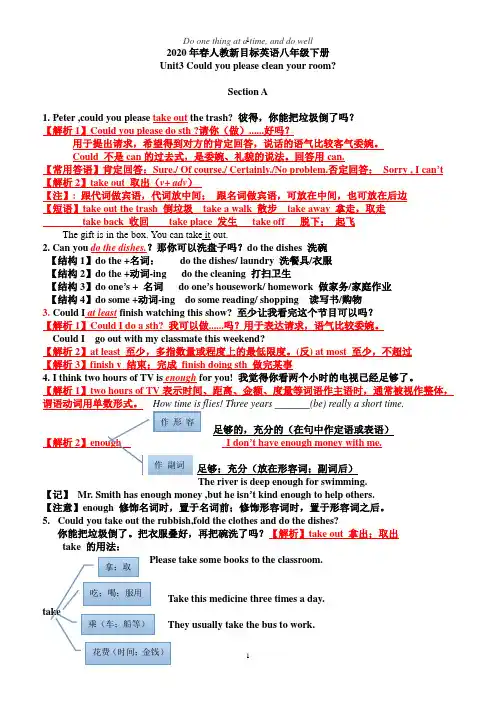
2020年春人教新目标英语八年级下册Unit3 Could you please clean your room?Section A1.Peter ,could you please take out the trash? 彼得,你能把垃圾倒了吗?【解析1】Could you please do sth ?请你(做)......好吗?用于提出请求,希望得到对方的肯定回答,说话的语气比较客气委婉。
Could 不是can的过去式,是委婉、礼貌的说法。
回答用can.【常用答语】肯定回答:Sure./ Of course./ Certainly./No problem.否定回答:Sorry , I can’t 【解析2】take out 取出(v+ adv)【注】: 跟代词做宾语,代词放中间;跟名词做宾语,可放在中间,也可放在后边【短语】take out the trash 倒垃圾take a walk 散步take away 拿走,取走take back 收回take place 发生take off 脱下;起飞The gift is in the box. You can take it out.2. Can you do the dishes.?那你可以洗盘子吗?do the dishes 洗碗【结构1】do the +名词:do the dishes/ laundry 洗餐具/衣服【结构2】do the +动词-ing do the cleaning 打扫卫生【结构3】do one’s + 名词do one’s housework/ homework 做家务/家庭作业【结构4】do some +动词-ing do some reading/ shopping 读写书/购物3.Could I at least finish watching this show? 至少让我看完这个节目可以吗?【解析1】Could I do a sth? 我可以做......吗?用于表达请求,语气比较委婉。
Unit 3 Could you please clean your room?话题:教课目的:重难点:神态动词could 的用法要点句型: There is no need for to关于而言是没有必需的It is not enough to做是不够的The+比较级, the+比较级越越知识点:1.神态动词 could 的用法○1could为can的过去式,表示“过去的能力”它指引的一般疑问句的一定回答和否认回答都是 could.Could you play basketball when your were 5 years old?当你 5 岁时,你会打篮球吗?Yes, I could. No, I couldn ’t.○2Could you?/Could you please ? 麻烦你好吗?Li Lei, could you please help me?Could you come here soon?Could you please close the door?○3关于这类恳求的一定回答和否认回答的常用语一定回答常用语:Certainly./ Of course./With pleasure./No problem.否认回答常用语:Certainly not. /No, I ’m afraid I can ’t.○4表示恳求允许Could I? 我能够吗?Could I come in?我能够进来吗?对方回答时不可以用could,要用 can.Could I use your bicycle?Yes, you can.2.take out the rubbish 倒垃圾动副词构造中,名词作宾语,可放在中间或后边,代词作宾语,只好放中间。
rubbish 不行数名词rubbish体积小,破裂的,没实用的废物garbage厨房抛弃的节余物waste指任何被遗弃的东西或浪费的东西3.fold v. 折叠,对折He folded the letter and threw it into the rubbish bin. Could you please take out the rubbish?garbage collectionThere is much too waste in this house.他将信函叠起来扔进了垃圾箱里。
新目标八年级下册英语Unit 3Could you please clean your room?练习题一、用括号内所给单词的适当形式填空(本大题共40小题,每小题1分,共40分)1.The boy came up with the idea of ________________(fair).2.To my ________________(surprised),she finished her work on time.3.He is trying ________________(not make) mistakes.4.________________(have) sports makes us keep healthy.5.Our teacher asked Jim ________________(angry) why he was late for school again.用括号内所给动词的适当形式填空,必要时可加助动词或情态动词。
6.Could you please ________ (lend) me your bike?7.Linda is a careful girl. She hates ________(make) mistakes. 8.The cleaner ________ (sweep) the leaves here just now.9.My father often asks me __________ (sweep) the floor. 10.Thanks for ________ (buy) us the drinks and snacks.11.Jim spent five hours in finishing____________ (draw) the picture.12.Tom’s mother is very busy, so he needs_____________ (help) out around the house.13.I invited him ______________ (play) the game.14.It took me an hour ______________ (write) the letter.15.I spend two hours __________ (do) my homework.根据句意用括号内单词的适当形式填空。
新目标八年级下册英语Unit3词汇运用与所给词填空练习根据题意及所给单词的首字母或汉语提示,写出单词的正确形式。
1. Look! The k______is flying a kite in the park. He is very happy.2. The museum was far from our house. It took us two hours to r_____there.3. Linda is good at science, but Paul is b_____at it than her.4. The baby is crying (哭泣). Her brother tries his best to make her l_______.5. B___Jane and Nelly are students in No. 4 Middle School.6. This ______(镜子) is Lisa’s. Yours is over there.7. What is in your left __________(手)?8. His _________ (内心) was full of happiness (幸福).9. His mother shouted as _______ (大声地) as she could.10. “The early bird catches the worm (虫),” as the ________ (谚语) goes.e to the “tomato fight” in Spain!Once every year,people _________(扔) tomatoes at each other.12.Adams wore ________(衬衫) instead of white uniforms while visiting patients.13.Mother works all day and does housework all evening. She is very _______ (劳累的).14.Bill doesn't like reading.________ (也不) do I.15.It's a good idea to _______(分享) the taxi with others.16.I think it's really a _______(浪费) of time to play computer games.17.Jenny was ________(不舒服),so her mother took her to the hospital.18.If you don't study hard,your grades will ______(掉下).19.Too much ______ (精神压力) is bad for your health.20.The relationship between the two countries ________(发展) well now.21. Helen was i ___and her mom took her to the hospital.22. At night the temperature can d ____below 0℃. 23. You have too much s____. Why not take a tripto relax?24. Jim dislikes music. He thinks listening to musicis a w ____of time.25. S ____it’s too late, I have to go home.26. Michael d________ from the ladder (梯子) andwas badly hurt.27. S________ you are available now, I need yourhelp to finish making this car.28. Jack, your room is in a m________. Put awayyour books and tidy it now.29. —Cindy will drive to London this weekend.—Cindy? Impossible! She h________ driving.30. It's u________ that I'm working while theothers are relaxing under the tree.31. Jim lives next door. We are n .32. My mother thinks it is a w of time toplay computer games.33. Don't t the rubbish everywhere. Youshould put it in the dustbin(垃圾箱).34. Look! How dirty the floor is! Please s itright away.35. You should f your clothes and putthem away.36. –Sandy, could you please take our the r______?–No problem.37. I like to sweep the floor but I h______ to do thedishes.38. Don’t trouble me w______ I’m working.39. I get up at six o’clock I o______ to get toschool on time.40. May I b_____ your pen? Mine is broken.41. Most of us don’t like doing c_______at home.42. The l_______ room is too dirty.43.Have you f______ your homework?44. I can do the d______ and clean the kitchen.45.My brother’s bed room is always in m_____.He oftencan’t his things.46.Mom will be back from shopping any m___now.47. Your office is in a(n) _______(杂乱). Please clean it up.48. Mrs. Hunt ________ (扫) her yard (院子) every day.49. Ben ________ (折叠) the paper carefully and put it onthe table.50. Jackie is sitting on the ________ (地板).用括号内所给单词的适当形式填空。
Unit 3 Section A2 3a~4cⅠ.根据句意及首字母提示补全单词1.I have never been to New York before and n has Jane.2.Please p me the dictionary. I want to use it to look up the new word.3.I don't like French fries at all. In fact, I h to eat them.4.—I left my pen at home. Could I b yours, Jack?—Sure. Here you are.5.Jenny and her sister often help their parents do some c such as making beds and doing the dishes. Ⅱ.根据句意及汉语提示写出所缺的单词6.I bought a white (衬衫) for my father as a birthday present.7.I forgot to take my umbrella with me, so I got (湿的) when I arrived home.8.I hurt one of my (手指) when I cut the tomatoes.9.I left my wallet at home. Could you please(借给) me some money?10.I (扔) down my bag and sat on the sofa because I was so tired.Ⅲ.用所给单词的适当形式填空11.He hates (talk) with people he doesn't like.12.The boys are playing basketball while the girls (play) volleyball.13.I won't feel (surprise) if it snows tonight. I have read the weather report.14.When the lady caught the thief, she shouted at him (angry).15.My mother will tell him the truth as soon as he (come) back home.16.The minute my mother came back, I (stop) surfing the Internet.17.My father often does the (dish) after dinner.Ⅳ.根据汉语意思完成句子18.我们的父母一直在努力工作,以便给我们更好的生活。
新目标八年级下册Unit 3 Could you please clean your room?一、词性转换Section A1.sweep →(pt.)swept2.throw →(pt.) threw3.fold→(pt.) folded Section B1. lend →(pt.) lent2. hate →(pt.) hated3. stress →(v.) stress4. waste →(v.) waste5. provide →(pt.) provided6. depend→(pt.)depended7. independence →(adj.) independent8. fairness →(adj.) fair9. unfair →(反义词)fair二、短语归纳1. do the dishes 洗餐具2. take out the rubbish倒垃圾3. fold your clothes叠衣服4. sweep the floor 扫地5. make your/the bed 整理床铺6. go out for dinner 出去吃饭7. throw down 扔下8.in surprise 惊讶地9. hang out 闲逛10. hate to do sth. 讨厌做某事11. do chores 做杂务12.enough stress足够的压力13. in order to为了14. provide sth. for sb.向某人提供某物15. get good grades取得好成绩16.mind doing sth. 介意做某事17. depend on依赖;依靠18. look after 照顾,照看19. keep it clean and tidy保持它干净整洁20. get into 进入21. take care of 照顾22. as a result 结果23. do one’ s part in (doing )sth. 做某人分内的事24. get a ride 搭车25.stay out late在外面待到很晚三、句型集萃1. Could you please help out with a few things? 你能帮忙做些事情吗?2.Mom will be back from shopping at any minute now. And she won’t be happy if she sees this mess.妈妈现在随时都会购物回来,如果她看到这些一团糟,会不高兴的。
八年级下册英语第三单元知识归纳In the third unit of the eighth grade English textbook, we will focus on the topic of "Healthy Living". This unit covers a variety of important aspects related to maintaining a healthy lifestyle, including exercise, diet, and mental well-being. By the end of this unit, students will have a better understanding of how to make healthy choices in their daily lives.One key aspect of healthy living is regular exercise. Exercise is essential for maintaining physical fitness and overall health. It helps to strengthen muscles, improve cardiovascular health, and boost mood and mental well-being. In this unit, students will learn about different types of exercises, such as cardio, strength training, and flexibility exercises. They will also explore the benefits of each type of exercise and how to incorporate them into their daily routine.Another important topic covered in this unit is diet and nutrition. A balanced diet is crucial for maintaining good health and preventing diseases. Students will learn about the food pyramid, different food groups, and the importance of eating a variety of foods to ensure they get all the necessary nutrients. They will also learn about the dangers of unhealthy eating habits, such as consuming too much sugar, salt, and processed foods.In addition to physical health, mental well-being is also a key component of healthy living. Students will learn about the importance of managing stress, getting enough sleep, and practicing mindfulness and relaxation techniques. They will also explore the impact of social media and technology on mental health, as well as strategies for maintaining a healthy balance in their digital lives.Throughout this unit, students will engage in a variety of activities and assignments to reinforce their understanding of the topics covered. They will participate in group discussions, research projects, and presentations to demonstrate their knowledge and skills. By the end of the unit, students will have a comprehensive understanding of what it means to live a healthy lifestyle and the importance of making smart choices for their well-being.Overall, the third unit of the eighth grade English textbook provides students with valuable information and practical strategies for maintaining a healthy lifestyle. By focusing on exercise, diet, and mental well-being, students will be better equipped to make informed decisions about their health and well-being. This unit serves as a foundation for students to build upon as they continue to prioritize their health and wellness in the future.。
八年级下Unit 3 What were you doing when the UFO arrived?【单元目标】1.单词与短语well, buy, cut, land, while, experience, strange, around, follow, climb, shout, run,anywhere, happen, accident, modern, bright, silence, destroy, meaning, souvenir1.get out (of)2.in front of / in the frontof 3. take off4.buy for5. land on6. shout to / at7.run awaye in 9.hear about 10.the Museum of Flight11.happen to 12.stop doing 13.take place14.as... as2.目标句型:1. What were you doing when...?2. I was doing sth. when...3. How about... / What about...?4. What happened next?5. While sth./sb. was doing sth., I did...3.语法1. 过去进行时2. 情态动词的用法Ⅱ【重难点分析】一.过去进行时过去进行时表示过去某一时刻或者某段时间正在进行或发生的动作,常和表过去的时间状语连用,如:I was doing my homework at this time yesterday.昨天的这个时候我正在做作业。
They were waiting for you yesterday.他们昨天一直在等你。
过去进行时的构成:肯定形式:主语+was/were+V-ing否定形式:主语+was not (wasn't)/were not (weren't)+V-ing疑问形式:Was/Were+主语+V-ing。
基本用法:1.过去进行时表示过去某一段时间或某一时刻正在进行的动作。
常与之连用的时间状语有,at that time/moment, (at) this time yesterday (lastnight/Sunday/week…), at+点钟+yesterday (last night / Sunday…),when sb. did sth等时间状语从句,如:What were you doing at 7p.m. yesterday? 昨天晚上七点你在干什么?I first met Mary three years ago. She was working at a radio shop at the time. 我第一次遇到玛丽是在三年前,当时她在一家无线电商店工作。
I was cooking when she knocked at the door. 她敲门时我正在做饭。
2. when后通常用表示暂短性动词,while后通常用表示持续性动词,因此它所引导的状语从句中,谓语动词常用进行时态,如:When the car exploded I was walking past it.= While I was walking past the car it exploded.3.when用作并列连词时,主句常用进行时态,从句则用一般过去时,表示主句动作发生的过程中,另一个意想不到的动作发生了。
如:I was walking in the street when someone called me. 我正在街上走时突然有人喊我。
4. when作并列连词,表示“(这时)突然”之意时,第一个并列分句用过去进行时,when引导的并列分句用一般过去时。
如:I was taking a walk when I met him. 我正在散步,突然遇见了他。
We were playing outside when it began to rain. 我们正在外边玩,这时下起雨来了。
二.情态动词(Modal Verbs )Ⅱ4、情态动词表示“应该”、“必须”(shall, should, may, might, must, ought to)(1)shall和should用于表示“必须”:①. Each member shall wear a name card. (表示规定) 每一个会员必须配带名卡。
②. I should answer his letter as soon as possible. (表示应该) 我应该尽快给他回信。
③. You shouldn't judge a man always by the clothes. (shouldn't “不应该”含有劝告的意思)你不应该总是以貌取人。
④. The rules shall take effect on Jan. 1st. (shall 用于规章等,表示义务和规定)新规则于一月一日起生效。
(2)may和might用于表示“应该"(多用于法律等条文,一般上多用shall):①. Payment may be paid by check.(表示规定) 应以支票付款。
②. You might ask before you use my computer. (might表示应该)你应该先问过再使用我的电脑。
(3)must用于表示“必须”、“务必”:①. You must keep the place clean. (务必) 你务必保持地方干净。
②. We must obey orders. (表示有义务) 我们必须服从命令。
③. Must I pay now? (用于疑问句) (如回答不必时,需用 needn't 或 don't have to)我现在就得付款吗?5、情态动词表示“意图”、“打算”(will, would, shall, should)(1)will和would用于表示某种意图:①. I'll call you as soon as possible. (will 主要用于第一人称) 我会尽快打电话给你。
②. Will you accept this invitation? (用would 则表示更客气) 你愿意接受这邀请吗?③. Who will do the job? (用于条件句,可用于各种人称) 谁愿意做这事?④. We won't (will not) stay here too long. (will not 表示不愿) 我们不愿呆在这里太久。
(2)shall和should用于表示说话人的意图:①. We shan't (shall not) go if it rains. (shall not 也可用 will not)如果下雨,我们就不打算走了。
②. I shan't go with you. (shall 只用在第一人称) 我不打算和你一同走。
6、情态动词表示“意愿”(will, would, shall, should)(1)will和would:①. She will do it if you ask her.(表示主语的意愿) 如果你问她,她会做的。
②. Would you have another cup of tea? (用 would 比 will 客气) 你想再来一杯茶吗?③. Will you have some cookies? (will用于疑问句,表示问人是否愿意)你想吃些烤饼吗?④. If he will, he can do it. (will 用于条件句,用于第二、三人称) 如果他愿意,他会做的。
⑤. Would you excuse me? (would 表示婉转语气) 你能原谅我吗?(2)shall和should:①. He shall get his allowance. (注意是he shall, 表示说话人的意愿)他会拿到他的津贴的。
②. You should sit here as long as you like.只要你乐意,坐多久能行。
③. Shall you go to school with me? (疑问句中,表示问对方的意愿)你愿意和我一起到学校去吗?三.重点词汇1.cut v.切;剪;割cut (one’s)hair理发Be careful.Don't cut yourself.小心,别切到自己。
2.alien n.外星人Nobody knows whether there are aliens or not.没人知道到底有没有外星人。
An alien got out of the UFO. 一个外星人从不明飞行物里出来。
3.land v.登岸;登陆;降落The plane will land in ten minutes.飞机将在十分钟后降落。
A UFO landed in the middle of the field.. 一个不明飞行物降落在田野中间。
4.while conj.当……的时候;在……之时While I danced, she sang.我跳舞,她唱歌。
While he was singing, I was playing baseball. 他当时在唱歌,而我在打棒球。
5.right adv.正好;恰好The accident happened right over there.事故正好发生在那里。
He lives right in the center of the city. 他恰好住在市中心。
6.surprised adj.惊奇的;吃惊的I was surprised that he was late for the party.我很惊讶他聚会居然迟到了。
She was surprised that I didn’t know about that.她很吃惊我竟不知那件事。
7.kid v.欺骗;哄骗I'm not kidding you.我没有骗你。
You’re kidding = No kidding.别开玩笑了。
8.anywhere adv.到处;无论哪里(用于否定句和一般疑问句中)Did you go anywhere yesterday? 你昨天去没去过什么地方?They didn’t go anywhere the day before yesterday. 他们前日天哪里也没去9.happen v.发生A funny thing happened in the subway yesterday.昨天地铁里发生了一件有趣的事。